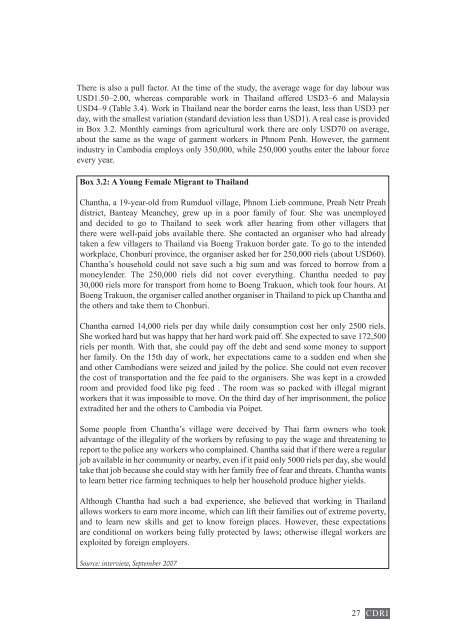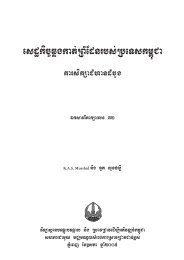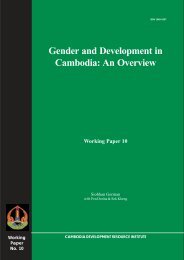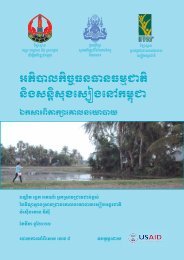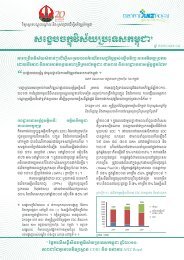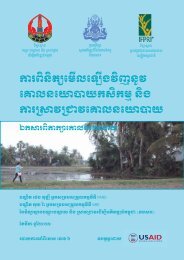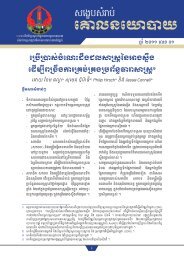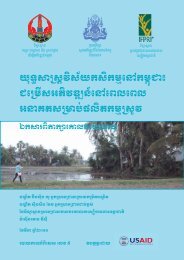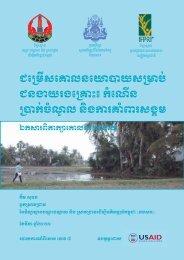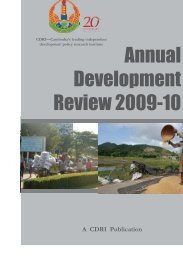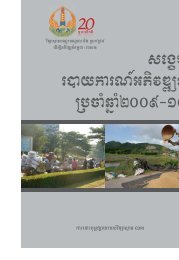Cambodia Country Study Working Paper Series No. 44 ... - CDRI
Cambodia Country Study Working Paper Series No. 44 ... - CDRI
Cambodia Country Study Working Paper Series No. 44 ... - CDRI
Create successful ePaper yourself
Turn your PDF publications into a flip-book with our unique Google optimized e-Paper software.
There is also a pull factor. At the time of the study, the average wage for day labour was<br />
�������������� �������� ����������� ����� ��� ��������� �������� ������� ���� ���������<br />
USD4–9 (Table 3.4). Work in Thailand near the border earns the least, less than USD3 per<br />
day, with the smallest variation (standard deviation less than USD1). A real case is provided<br />
�������������������������������������������������������������������������������������<br />
about the same as the wage of garment workers in Phnom Penh. However, the garment<br />
industry in <strong>Cambodia</strong> employs only 350,000, while 250,000 youths enter the labour force<br />
every year.<br />
�������������������������������������������<br />
Chantha, a 19-year-old from Rumduol village, Phnom Lieb commune, Preah Netr Preah<br />
���������� �������� ���������� ����� ��� ��� �� ����� ������� ��� ������ ���� ���� �����������<br />
and decided to go to Thailand to seek work after hearing from other villagers that<br />
��������������������������������������������������������������������������������������<br />
taken a few villagers to Thailand via Boeng Trakuon border gate. To go to the intended<br />
workplace, Chonburi province, the organiser asked her for 250,000 riels (about USD60).<br />
Chantha’s household could not save such a big sum and was forced to borrow from a<br />
moneylender. The 250,000 riels did not cover everything. Chantha needed to pay<br />
30,000 riels more for transport from home to Boeng Trakuon, which took four hours. At<br />
Boeng Trakuon, the organiser called another organiser in Thailand to pick up Chantha and<br />
the others and take them to Chonburi.<br />
Chantha earned 14,000 riels per day while daily consumption cost her only 2500 riels.<br />
She worked hard but was happy that her hard work paid off. She expected to save 172,500<br />
riels per month. With that, she could pay off the debt and send some money to support<br />
her family. On the 15th day of work, her expectations came to a sudden end when she<br />
��������������������������������������������������������������������������������������<br />
the cost of transportation and the fee paid to the organisers. She was kept in a crowded<br />
room and provided food like pig feed . The room was so packed with illegal migrant<br />
workers that it was impossible to move. On the third day of her imprisonment, the police<br />
extradited her and the others to <strong>Cambodia</strong> via Poipet.<br />
Some people from Chantha’s village were deceived by Thai farm owners who took<br />
advantage of the illegality of the workers by refusing to pay the wage and threatening to<br />
report to the police any workers who complained. Chantha said that if there were a regular<br />
���������������������������������������������������������������������������������������������<br />
���������������������������������������������������������������������������������������������<br />
��������������������������������������������������������������������������������������<br />
Although Chantha had such a bad experience, she believed that working in Thailand<br />
allows workers to earn more income, which can lift their families out of extreme poverty,<br />
and to learn new skills and get to know foreign places. However, these expectations<br />
are conditional on workers being fully protected by laws; otherwise illegal workers are<br />
exploited by foreign employers.<br />
Source: interview, September 2007<br />
27 <strong>CDRI</strong>


